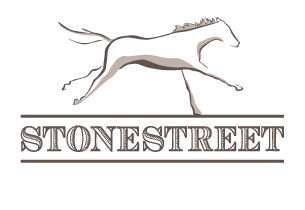The foundation of successful preparation of sales yearlings is established when a mating is chosen and must be followed by proper care and nutrition during pregnancy and parturition, and subsequent good management of the foal. This base of best of practice care should (hopefully!) bring us to June of the yearling year with a crop of sound, well grown, athletic individuals. Yearling Sale Preparation refers to the three months preceding the sale and our aim is to prepare the yearling, physically and mentally, for shipping to the sale grounds and being shown to prospective purchasers for approximately three days before they are sold at auction.
Sales preparation is not intended to bring the yearling to peak fitness but rather offers potential purchasers a more obvious impression of what the horse will be like as an adult. Tailoring preparation to the individual horse is key, just as with training at later stages of life.
We offer approximately 60 yearlings at public auction each year, the majority at the Keeneland September Yearling Sale.
Every time a foal is handled from birth is an educational opportunity, over the Winter and Spring they have been introduced to bits in their mouths and the colts have been separated from each other into adjacent individual paddock, the fillies will remain in small groups. Overseen by our Yearling Farm Manager at our 600-acre facility in Versailles, Kentucky, yearling sale preparation begins in earnest in June and focuses on four areas:
Nutrition
Feeding the yearling is an art and close monitoring of each individual is the key. Due to the low stocking density on our Kentucky bluegrass pasture, much of the nutrition is received whilst grazing, the remainder comes from 14% sweet feed and good quality hay. It is key to supply youngstock with the nutrients and calories essential for development but the overweight yearling must be avoided, overfeeding can cause issues such as OCD’s and epiphysitis. Great nutrition is our focus from before a foal is even born but once exercise begins calories are increased accordingly and oil is added, the high fat content helping produce a good coat. Our Yearling Farm Manager closely monitors progress visually and tweaks the feed accordingly.
Exercise
It is important that yearlings spend a significant portion of their time turned out but to supplement this exercise we use a mechanical horse walker. The walker is hexagonal in shape; mesh gates suspended from the roof create six separate areas and the entire area is enclosed with a high fence. Each yearling is loose in its own area and jogs around to keep pace with the gates. The mechanical walker allows us to adjust speed, travel clockwise and counter-clockwise and exercise six yearlings simultaneously. We customize the intensity and duration depending on the individual’s needs.
We want horse to look at its best for the sale, but not at the expense of future athletic ability. We are extremely careful not to overstress immature ligaments, tendons, joints or muscles with too vigorous of an exercise regime. We exercise only to ensure our yearlings are fit enough to show at the sales grounds without tiring.
Grooming
Our turn out schedule becomes 7:00 pm to 7:00am; this avoids the bleaching effect of the sun on the coat. Our yearlings are groomed daily, this helps with a glossy coat but is also an ongoing educational opportunity for these youngsters. Each yearling is groomed for approximately 45 minutes every day.
Showing
Our foals are used to being led by a handler from birth but we put a lot of effort into ensuring they behave professionally at the sale. At the sale they are expected to purposefully walk away from a prospective buyer, make a good, smooth right-hand turn and return on the same track. They then stand in standard conformational pose in front of the buyer (left side facing buyer, right front hoof slightly behind left, right hind hoof slightly in front of left). Practicing walking, turning and standing at home is key – there are a lot of distractions at the sale, some buyers will look very quickly, others for much longer – the yearling must be happy to take all this in his stride.
Our yearlings will remain barefoot until final shoeing a week before the sale. We then wrap their legs and load them onto the trailer for the short journey to the Keeneland sales grounds hoping that all the preparation leads to a good sale and a great racing career for the new owner!
